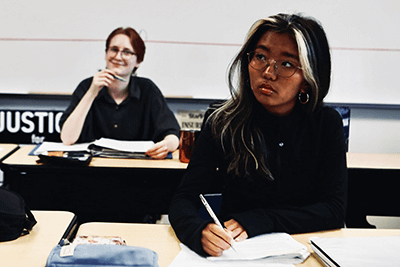October 3, 2024

There’s a current TikTok trend that involves high school teachers reading emails that they’ve received from their students out loud. They often start with “Hey,” or “Whatsup,” if they contain a salutation. And let’s just say that rarely do they close with a “Thank you.”
While perhaps entertaining, this trend illustrates a disheartening disparity in how young people are being prepared for the workplace of the future. Rapidly changing trends and expectations shape how progressive independent schools like Mounds Park Academy equip students with essential workplace skills for life beyond the four walls of a classroom.
The trend popped into the head of admission and communications director Natalie Waters Seum recently, when she was chatting a newer MPA student. They were talking about how she might navigate the academic bumps in the road that will inevitably come in a rigorous college-prep school. Natalie encouraged her to reach out to her teacher for clarification and support and asked her if she knew how to do that well. While it shouldn’t have been, her response was pleasantly surprising. She retold with great detail what she had learned during the “How To Write An Email To A Teacher” lesson in Mr. Dean’s ninth-grade seminar class. The lesson covers topics such as formal letter structure, salutations, tone, attachments, and more. Notably, the lesson also teaches MPA students to share the solutions they’ve already tried—helping encourage them to take responsibility for their own academic journeys. This lesson is one of the hundreds of ways that MPA intentionally prepares MPA students for a new workplace daily.
Last May, Dr. Bill Hudson, head of school, wrote about MPA’s Portrait Of A Graduate and Competency Framework. He shared, “These nine competencies are specific, transferable, and empowering learning outcomes that prepare learners for college, career, and civic life; taken together and within the context of the MPA curricular experience, they represent the attainment of the full MPA vision for a student’s education.” The nine competencies include:
- Build Community
- Communicate Ideas
- Design Solutions
- Investigate Through Inquiry
- Lead My Learning
- Learn In Community
- Read The World
- Reason Quantitatively
- Sustain Wellness
Intentionally teaching these competencies has been at the heart of an MPA education since the school was founded in 1982. To be clear, they are not taught in lieu of discipline-specific content or skills but partner with it. It is enlightening to compare MPA’s competencies to recent workplace research and MPA alumni perspectives. The alignment is intentional and remarkable. For example:
Analytical Thinking:
The World Economic Forum’s “Future of Jobs Report 2023” shares, “Analytical thinking is considered a core skill by more companies than any other skill and constitutes, on average, 9% of the core skills reported by companies.” Analytical thinking includes data-driven decision-making, problem-solving, critical evaluation, and more. Several of MPA’s competencies include analytical thinking including “Reason Quantitatively,” “Design Solutions,” and “Investigate Through Inquiry.” Kevin McQuade ’07, a leader in Federal transportation security, cybersecurity operations, and procurement, reflects on how analytical thinking was embedded in his experience: “I was always encouraged to ask more questions, challenge thoughts, and learn from those around me.”
Adaptability:
The Harvard Business Review argues in an article called “Competing In the New World Of Work” that adaptability will be key to thriving in tomorrow’s workplace. Employees who learn quickly, adapt regularly, and keep up with industry changes will likely be in high demand. Adaptability is embedded throughout the competencies, particularly in “Build Community,” “Lead My Learning,” and “Sustain Wellness.” According to Christian DeMarais ’07, an actor and a leader in revenue operations and strategy in the technology space, “MPA cultivated an environment in which any student could … risk failure without fear … not operating from a place of fear but from belief in your talent, intelligence, resourcefulness, and impulse to solve whatever is thrown your way. MPA laid such an essential foundation for us to take this out in the world and apply it to anything and everything we ended up doing.”
Cross-Cultural Competency:
As globalization continues to shape business, Deloitte’s “2020 Global Human Capital Trends Report” underscores the importance of the workforce being more global and interconnected. The MPA competencies where this is most prevalent are “Build Community,” “Communicate Ideas,” and “Read The World.” This is not just a moral imperative but a business essential. Elizabeth Larson ’08, a postdoctoral fellow in public health, appreciated the emphasis on this. “Teachers at MPA encouraged and challenged students to understand their immense privilege in the world and to use their privilege to improve the global community. This recognition has been my moral and professional compass throughout my adult life.”
Communication, analytical thinking, adaptability, cross-cultural competency—MPA graduates are exceptionally well equipped with these workplace skills and so many more. Do you put these competencies at the top of your list as you embark on a hiring process? We certainly do.